
Bullying: Anti-Bullying



www.EducationDx.com

Other pages of interest:

EducationDx
©2015, 2023
©2015, 2023

■
What is Bullying?
■
Bullying Quick Notes
■
Dealing with Bullying
■
Cyberbullying
■
Bystander Intervention
Next>>
Cyberbullying
Cyberbullying
Some schools have bully prevention/intervention programs. Some schools have made an attempt to start some type of program, but don't have a functioning program in place.
Unfortunately, some schools have no bully prevention/intervention program, and simply rely upon their discipline policy to punish violators. This action sometimes inadvertently punishes the victim in a bullying incident for fighting or for being involved in a "conflict." Bullying is not a conflict; it is a victimization.
Your school district's bullying policy and program should determine what steps you follow. Follow your district's plan (if they have one).
Your school district's bullying policy and program should determine what steps you follow. Follow your district's plan (if they have one).
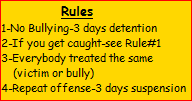

>If you are being bullied:
You need to seek help from an adult . Websites and books provide some basic information, but you really need to discuss this problem with your parents/guardians and your teacher, counselor or principal. They can help you deal with this problem, and develop a plan to help prevent future problems from happening.
You need to seek help from an adult . Websites and books provide some basic information, but you really need to discuss this problem with your parents/guardians and your teacher, counselor or principal. They can help you deal with this problem, and develop a plan to help prevent future problems from happening.

"Well...I punched this bully..."
Thanks, but NO THANK$!
-Lawsuit? You can be sued $
-Criminal Charges? You can be charged $
-Injuries? You can be hurt $
-Suspension? You can be suspended
"Who" started the fight-may not matter!
Thanks, but NO THANK$!
-Lawsuit? You can be sued $
-Criminal Charges? You can be charged $
-Injuries? You can be hurt $
-Suspension? You can be suspended
"Who" started the fight-may not matter!
Helpful Advice--I don't think so!
Note: Be careful with information and stories offered by well-intentioned friends or irresponsible adults . Sometimes they may make things worse by suggesting that you do something that "worked for them" (that may or may not be factual). Not every "fight" ends with the underdog winning.
*(see note under "If you are being attacked" below)
*(see note under "If you are being attacked" below)

>If you have been bullied:
1. Tell an adult what has happened. Talk with your parents/guardians and school officials. Trying to solve this as a group takes some of the pressure and worry off of you. You will feel better just talking about the problem to someone who cares!
1. Tell an adult what has happened. Talk with your parents/guardians and school officials. Trying to solve this as a group takes some of the pressure and worry off of you. You will feel better just talking about the problem to someone who cares!
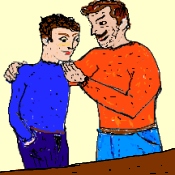
>If you are being attacked:
1. Try to stay calm.
2. Try to ignore the bully if it is a verbal attack (name calling). Keep walking and try to get to an area where there are others present (preferably adults). Some bullies will just move on to another victim in an attempt to get some type of reaction.
1. Try to stay calm.
2. Try to ignore the bully if it is a verbal attack (name calling). Keep walking and try to get to an area where there are others present (preferably adults). Some bullies will just move on to another victim in an attempt to get some type of reaction.

3. Be confident! Tell them to "stop" if the bully becomes aggressive. Sometimes just saying "stop" works. This might work if your school has a bully prevention/intervention program and the bully knows what this means. In any case, keep walking.
4. If it becomes or looks like it will become physical, get away from the situation as quickly as you can. This isn't being a chicken, it is being smart and the right thing to do.
4. If it becomes or looks like it will become physical, get away from the situation as quickly as you can. This isn't being a chicken, it is being smart and the right thing to do.

*Note: Every situation is different. What works in one situation may not work in another. Use caution. Talk with your parents/guardians, school officials and law enforcement members about what to do if you are attacked.
>Talking to an adult about bullying:
1. Describe what has happened to you, how often it has happened, who is involved, and where it is happening.
2. Explain how you are feeling about the situation and ask for advice to make things better.
3. Ask your parents/guardians to advocate for a bullying prevention/intervention program in your school if you don't have one. If you have one, have them ask questions about the program and work to improve it . It takes everyone working together to solve bullying problems.
1. Describe what has happened to you, how often it has happened, who is involved, and where it is happening.
2. Explain how you are feeling about the situation and ask for advice to make things better.
3. Ask your parents/guardians to advocate for a bullying prevention/intervention program in your school if you don't have one. If you have one, have them ask questions about the program and work to improve it . It takes everyone working together to solve bullying problems.






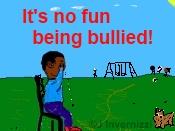
5. Some experts say don't fight, if you can help it. Of course, you can defend yourself--by retreating.*(see note) Most bullies are bigger or stronger than their victims, and sometimes have henchmen (their "friends") that might step in to "help" him/her. If you fight back you could make the situation worse, get hurt, or possibly get blamed for starting the fight.


EducationDx
is a
FREE
Website
is a
FREE
Website

Bullying: In the Schools
Dealing with Bullying

see:
CYBERBULLYING
on this site!
CYBERBULLYING
on this site!
Why are some children afraid to go to school?
Why do some children hate to go to school?
Why do some children hate to go to school?


Bullying_Anti-Bullying
This is a FREE information site!
Note: Larger computer screens will show larger materials!

www.EducationDx.com

Bullying: Anti-Bullying
Dealing with Bullying
Some schools have bully prevention/intervention programs. Some schools have made an attempt to start some type of program, but don't have a functioning program in place.
Unfortunately, some schools have no bully prevention/intervention program, and simply rely upon their discipline policy to punish violators. This action sometimes inadvertently punishes the victim in a bullying incident for fighting or for being involved in a "conflict." Bullying is not a conflict; it is a victimization.
Your school district's bullying policy and program should determine what steps you follow. Follow your district's plan (if they have one).
Your school district's bullying policy and program should determine what steps you follow. Follow your district's plan (if they have one).

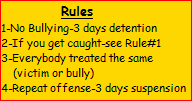


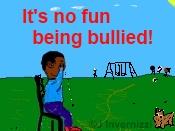
>If you are being bullied:
You need to seek help from an adult. Websites and books provide some basic information, but you really need to discuss this problem with your parents/guardians and your teacher, counselor or principal. They can help you deal with this problem, and develop a plan to help prevent future problems from happening.
You need to seek help from an adult. Websites and books provide some basic information, but you really need to discuss this problem with your parents/guardians and your teacher, counselor or principal. They can help you deal with this problem, and develop a plan to help prevent future problems from happening.
Note: Be careful with information and stories offered by well-intentioned friends or irresponsible adults . Sometimes they may make things worse by suggesting that you do something that "worked for them" (that may or may not be factual). Not every "fight" ends with the underdog winning.
*(see note under "If you are being attacked" below)

Helpful Advice--I don't think so!
"Well...I punched this bully..."
Thanks, but NO THANK$!
-Lawsuit? You can be sued $
-Criminal Charges? You can be charged $
-Injuries? You can be hurt $
-Suspension? You can be suspended
"who" started the fight-may not matter!
Thanks, but NO THANK$!
-Lawsuit? You can be sued $
-Criminal Charges? You can be charged $
-Injuries? You can be hurt $
-Suspension? You can be suspended
"who" started the fight-may not matter!

You have the right to feel safe in school.


>If you have been bullied:
1. Tell an adult what has happened. Talk with your parents/guardians and school officials. Trying to solve this as a group takes some of the pressure and worry off of you. You will feel better just talking about the problem to someone who cares!
1. Tell an adult what has happened. Talk with your parents/guardians and school officials. Trying to solve this as a group takes some of the pressure and worry off of you. You will feel better just talking about the problem to someone who cares!
2. Avoid the bully and his/her friends if possible until the problem is solved. Stay away from isolated areas in the building.
3. Eat lunch, go to the restroom and walk with a group (friends, if possible) to school and when going to the bus or walking home. There is some safety in numbers, and some bullies don't like lots of non-friendly or adult witnesses to their bullying. If you don't have many friends in some areas (e.g., in your grade, in your classes, at your school, around your neighborhood), try to make some by being friendly.
4. Let the school officials sort the problem out and develop a plan to help you and the others that are victimized by the bully. It is their job to help keep you safe. But they can only help if you tell them. Remember: "Tattling" and "asking for help" are not the same.
5. If the adults do their job, in most cases, the problem can be resolved. This problem won't last forever.
3. Eat lunch, go to the restroom and walk with a group (friends, if possible) to school and when going to the bus or walking home. There is some safety in numbers, and some bullies don't like lots of non-friendly or adult witnesses to their bullying. If you don't have many friends in some areas (e.g., in your grade, in your classes, at your school, around your neighborhood), try to make some by being friendly.
4. Let the school officials sort the problem out and develop a plan to help you and the others that are victimized by the bully. It is their job to help keep you safe. But they can only help if you tell them. Remember: "Tattling" and "asking for help" are not the same.
5. If the adults do their job, in most cases, the problem can be resolved. This problem won't last forever.


>If you are being attacked:
1. Try to stay calm.
2. Try to ignore the bully if it is a verbal attack (name calling). Keep walking and try to get to an area where there are others present (preferably adults). Some bullies will just move on to another victim in an attempt to get some type of reaction.
1. Try to stay calm.
2. Try to ignore the bully if it is a verbal attack (name calling). Keep walking and try to get to an area where there are others present (preferably adults). Some bullies will just move on to another victim in an attempt to get some type of reaction.
3. Be confident! Tell them to "stop" if the bully becomes aggressive. Sometimes just saying "stop" works. This might work if your school has a bully prevention/intervention program and the bully knows what this means. In any case, keep walking.
4. If it becomes or looks like it will become physical, get away from the situation as quickly as you can. This isn't being a chicken, it is being smart and the right thing to do.
4. If it becomes or looks like it will become physical, get away from the situation as quickly as you can. This isn't being a chicken, it is being smart and the right thing to do.

5. Some experts say don't fight, if you can help it. Of course, you can defend yourself--by retreating.*(see note) Most bullies are bigger or stronger than their victims, and sometimes have henchmen (their "friends") that might step in to "help" him/her. If you fight back you could make the situation worse, get hurt, or possibly get blamed for starting the fight.
*Note: Every situation is different. What works in one situation may not work in another. Use caution. Talk with your parents/guardians, school officials and law enforcement members about what to do if you are attacked.
Discipline Policy that does not address bullying problem
Discipline Policy that does not address bullying problem


>Talking to an adult about bullying:
1. Describe what has happened to you, how often it has happened, who is involved, and where it is happening.
2. Explain how you are feeling about the situation and ask for advice to make things better.
3. Ask your parents/guardians to advocate for a bullying prevention/intervention program in your school if you don't have one. If you have one, have them ask questions about the program and work to improve it . It takes everyone working together to solve bullying problems.
1. Describe what has happened to you, how often it has happened, who is involved, and where it is happening.
2. Explain how you are feeling about the situation and ask for advice to make things better.
3. Ask your parents/guardians to advocate for a bullying prevention/intervention program in your school if you don't have one. If you have one, have them ask questions about the program and work to improve it . It takes everyone working together to solve bullying problems.



2. Avoid the bully and his/her friends if possible until the problem is solved. Stay away from isolated areas in the building.
3. Eat lunch, go to the restroom and walk with a group (friends, if possible) to school and when going to the bus or walking home. There is some safety in numbers, and some bullies don't like lots of non-friendly or adult witnesses to their bullying. If you don't have many friends in some areas (e.g., in your grade, in your classes, at your school, around your neighborhood), try to make some by being friendly.
4. Let the school officials sort the problem out and develop a plan to help you and the others that are victimized by the bully. It is their job to help keep you safe. But they can only help if you tell them. Remember: "Tattling" and "asking for help" are not the same.
5. If the adults do their job, in most cases, the problem can be resolved. This problem won't last forever.
3. Eat lunch, go to the restroom and walk with a group (friends, if possible) to school and when going to the bus or walking home. There is some safety in numbers, and some bullies don't like lots of non-friendly or adult witnesses to their bullying. If you don't have many friends in some areas (e.g., in your grade, in your classes, at your school, around your neighborhood), try to make some by being friendly.
4. Let the school officials sort the problem out and develop a plan to help you and the others that are victimized by the bully. It is their job to help keep you safe. But they can only help if you tell them. Remember: "Tattling" and "asking for help" are not the same.
5. If the adults do their job, in most cases, the problem can be resolved. This problem won't last forever.
Next>>
Cyberbullying
Cyberbullying

Amazon Links
Disclosure:
Some links on this website are associate links and are used to help illustrate what an item looks like, and you can decide if you want to just look or purchase the item. "As an Amazon Associate, I earn from qualifying purchases." We receive a small commission (that helps support this website) if you actually purchase from this company, but the price to you remains the same.
You can hover over any link to see if it is an Amazon link, if this matters, or a link to a page on this website or to a reference page, e.g., Smithsonian Institution, bookmark on this website, etc.
Some links on this website are associate links and are used to help illustrate what an item looks like, and you can decide if you want to just look or purchase the item. "As an Amazon Associate, I earn from qualifying purchases." We receive a small commission (that helps support this website) if you actually purchase from this company, but the price to you remains the same.
You can hover over any link to see if it is an Amazon link, if this matters, or a link to a page on this website or to a reference page, e.g., Smithsonian Institution, bookmark on this website, etc.

see:
CYBERBULLYING
on this site!
CYBERBULLYING
on this site!

Amazon Links
Disclosure:
Some links on this website are associate links and are used to help illustrate what an item looks like, and you can decide if you want to just look or purchase the item. "As an Amazon Associate, I earn from qualifying purchases." We receive a small commission (that helps support this website) if you actually purchase from this company, but the price to you remains the same.
You can hover over any link to see if it is an Amazon link, if this matters, or a link to a page on this website or to a reference page, e.g., Smithsonian Institution, bookmark on this website, etc.
Some links on this website are associate links and are used to help illustrate what an item looks like, and you can decide if you want to just look or purchase the item. "As an Amazon Associate, I earn from qualifying purchases." We receive a small commission (that helps support this website) if you actually purchase from this company, but the price to you remains the same.
You can hover over any link to see if it is an Amazon link, if this matters, or a link to a page on this website or to a reference page, e.g., Smithsonian Institution, bookmark on this website, etc.
EducationDx
©2015, 2023
©2015, 2023